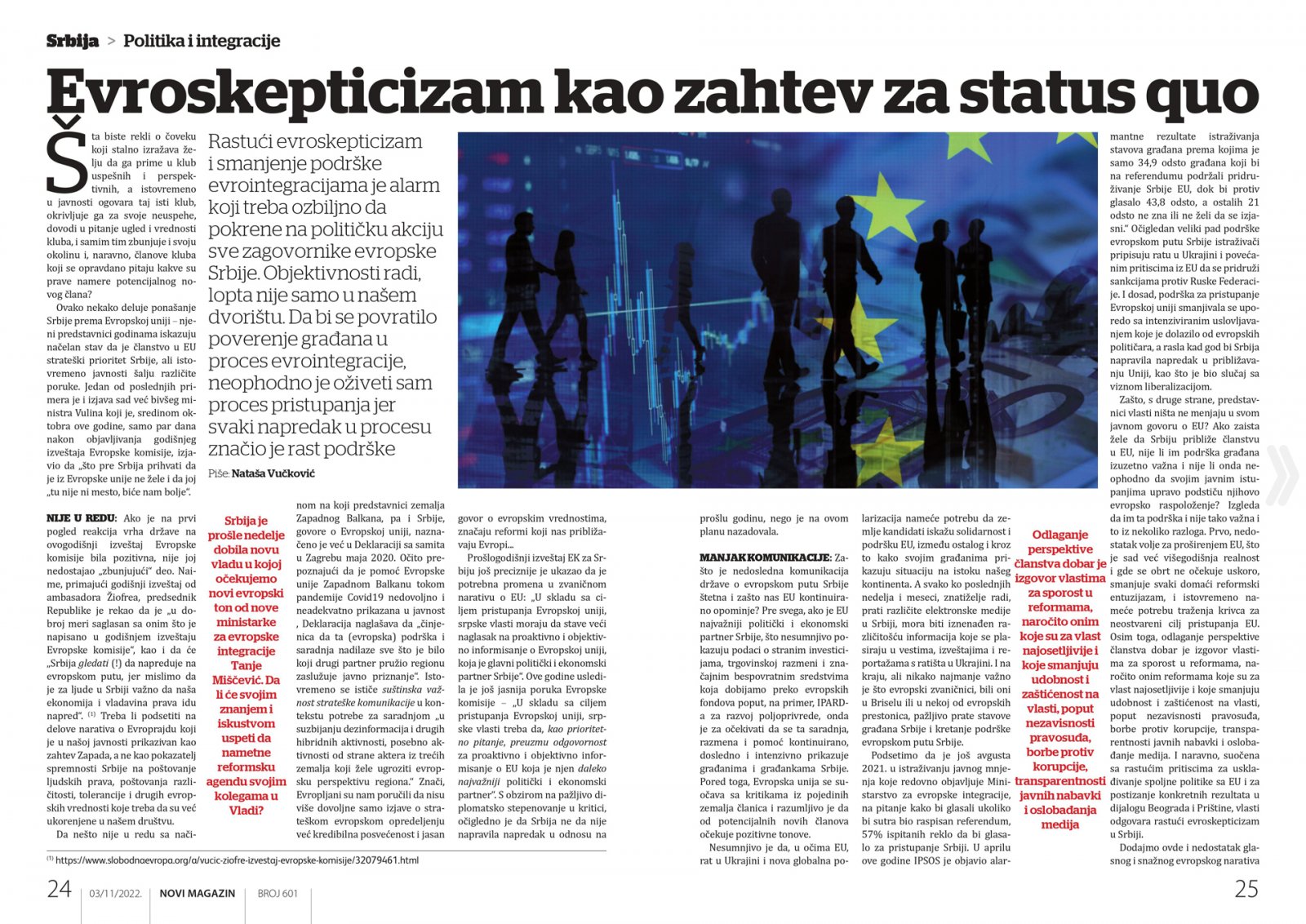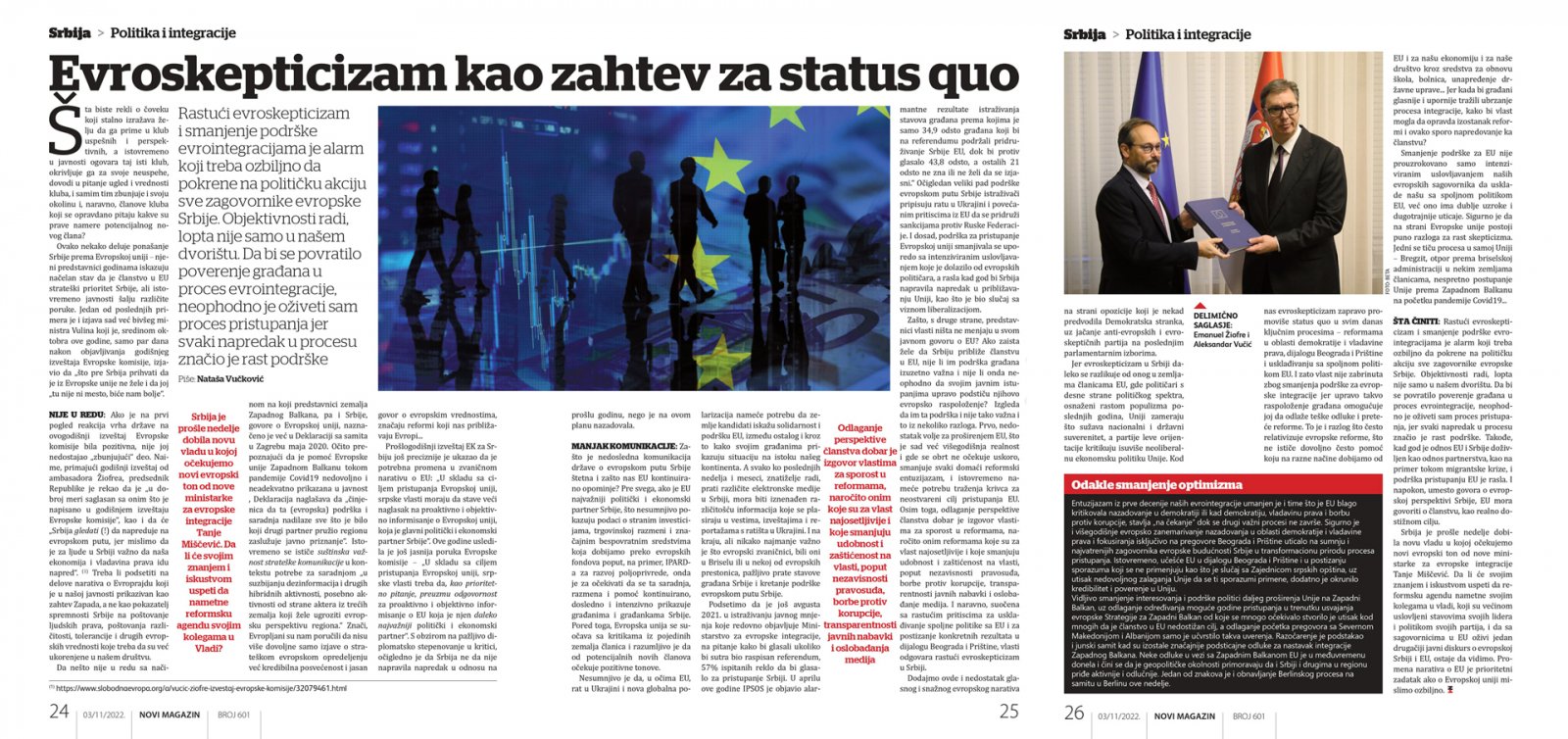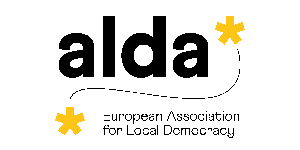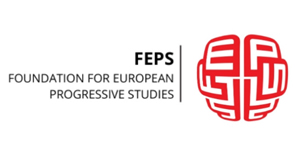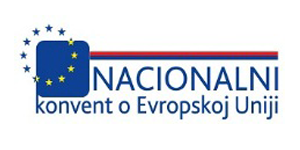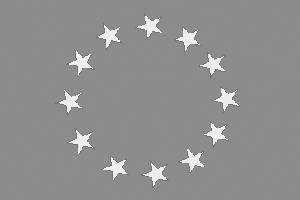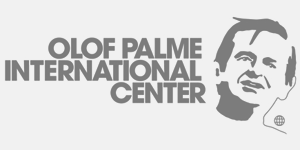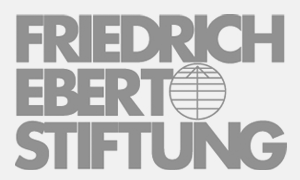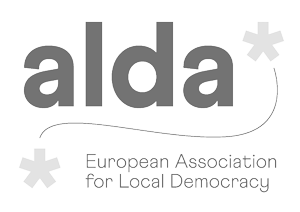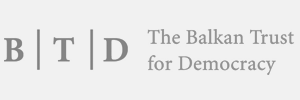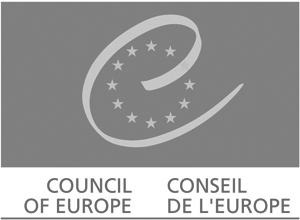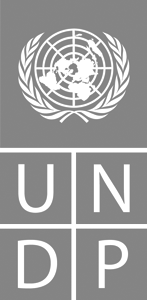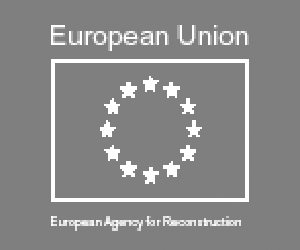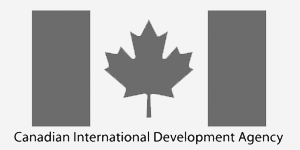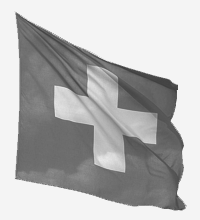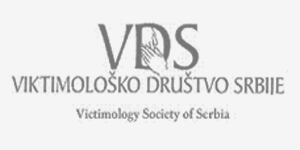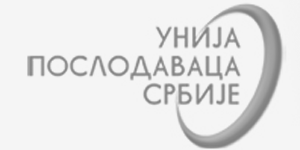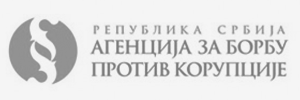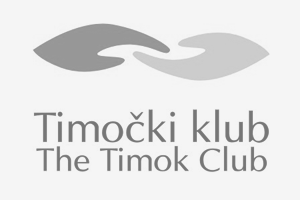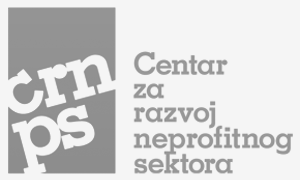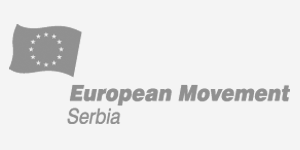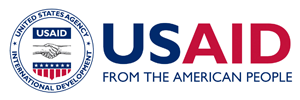Euroscepticism as an excuse to maintain status quo
Nataša Vučković, author of the text for Novi Magazin weekly newsmagazine
Increased Euroscepticism and the decrease in support of European integration should be enough to sound the alarm, triggering serious political action to be taken by all advocates of a European Serbia. For objectivity’s sake, the ball is not only in our court. In order to regain the trust of the people in the European integration process, it is necessary to revitalise the accession process itself, as each step forward in the process results in an increase of support
What would you say about a man who consistently expresses a desire to be included in a club of successful, forward-thinking people whilst at the same time badmouthing this very same club, blaming it for its shortcomings, bringing into question its reputation and value? His agenda is to confuse those around him, including of course, the members of this very same club who, rightly so, wonder about the intentions of this potential new member.
This seems to accurately describe Serbia’s behaviour toward the EU - the country’s representatives have spent years expressing a tentative position, saying that EU membership is a strategic priority for Serbia, while at the same time sending mixed messages to the public. One of the latest examples of this is a statement made mid-October by now former Minister Vulin, just days after the annual European Commission Progress Report was published. In his statement he said, “the quicker Serbia accepts that it is unwanted, and that our place is not with the European Union, the better”.
Although the initial reaction of top officials to this year’s annual European Commission Progress Report was positive, it was not without elements that brought confusion. Namely, when the President of the Republic received the annual Report from Ambassador Gioffre, he said “on the whole, I agree with what you wrote in the annual Progress Report of the European Commission,” and “Serbia will do its best (!) to progress along its path toward the EU, because we think improving our economy and rule of law is what’s best for the people of Serbia”. (1) Do we need to remind the public of some of the narrative surrounding EuroPride, which is presented to our public as a requirement of the West, and not as an indicator of Serbia’s willingness to respect human rights, to respect differences, to promote tolerance and other European values which should have long been indoctrinated into our society.
The fact that there is something off in the way representatives of the Western Balkans talk about the European Union was noted in the Zagreb Declaration of May 2020. Obviously, while recognising that the European Union's assistance to the Western Balkans during the Covid-19 pandemic was insufficiently and inadequately presented to the public, the Declaration emphasises "The fact that (European) support and cooperation goes far beyond what any other partner has provided to the region deserves public acknowledgement.” At the same time, the vital importance of strategic communication within the context of the need for collaboration to “reinforce our cooperation on addressing disinformation and other hybrid activities originating in particular from third-state actors seeking to undermine the European perspective of the region” was emphasised. In other words, the Europeans have indicated to us that it is no longer enough to make statements about strategic European commitment but that we need to demonstrate credible dedication and clear speech concerning European values and the importance of reforms that will bring us closer to the EU, etc.
Last year’s EC Progress Report for Serbia clearly indicates that the official EU narrative requires change: “In line with their EU accession objective, the Serbian authorities need to place more emphasis on proactive and objective communication about the EU, which is Serbia’s main political and economic partner.” The message sent by the EC was even clearer this year - “In line with the EU accession objective, the Serbian authorities need to, as a matter of priority, take responsibility for proactive and objective communication on the EU, which is by far Serbia’s main political and economic partner.” Given the careful, diplomatic and gradual criticisms, it is evident that Serbia has not made any progress since last year, rather it has digressed.
Why is the inconsistent communication of the state concerning EU accession destructive and why does the EU continue to send us warnings? To start, if the EU is Serbia’s most important political and economic partner, which is undeniably proven by data concerning foreign investments, trade and the significant grants we receive through EU funds, such as IPARD for agricultural development, it is then normal to expect this collaboration, trade and aid be continuously, consistently and intensively presented to the public of Serbia. Furthermore, the EU faces criticism from certain member states and it is understandable that it would expect a positive tone from potential new members.
It is undeniable that in the eyes of the EU, the war in Ukraine and new global polarisation imposes the need for candidate countries to show their solidarity and support to the EU and to do so by showing their people what is happening in the eastern region of our continent. Anyone in Serbia following the various forms of electronic media over the past weeks and months, out of curiosity, must be surprised by the variety of information available in the news, reports and feature stories about the war in Ukraine. And, finally, but no less important, is that European officials, regardless of whether they are in Brussels or any other European capital, are carefully monitoring the views of the Serbian population and the direction in which support of Serbia’s accession is moving.
We must not forget that back in August 2021, in a public opinion poll regularly published by the Ministry of European Integration, when asked how they would vote if a referendum were called tomorrow, 57% of respondents said they would vote for Serbia’s accession. In April of this year, IPSOS published alarming polling results of public opinion where only 34.9 percent of the people would support Serbia joining the EU in a referendum, while 43.8 percent would vote against, and the remaining 21 percent do not know or do not wish to say. This obvious huge drop in support of Serbia’s accession to the EU was attributed by researchers to the war in Ukraine and increased pressure from the EU to join in the sanctions against the Russian Federation. And until now, support of accession to the EU has decreased in parallel with intensified conditionality coming from European politicians, and has increased whenever Serbia made progress in approaching the Union, as was the case with visa liberalisation.
Why then, do government representatives fail to make any changes in public speech concerning the EU? If they truly wish to bring Serbia closer to EU membership, shouldn’t the support of the citizenry be of extreme importance; and, isn't it necessary for these representatives to encourage a ‘European mood’ with each public appearance? It seems as though this support is not all that important and there are several reasons for this. First of all, the lack of desire for EU enlargement (which has been the reality for many years now and any sort of turnaround is not expected any time soon) reduces all domestic enthusiasm for reform. At the same time, this imposes a need to seek out a wrong-doer where the unfulfilled objective of Serbia’s accession to the EU is concerned. In addition, postponing the membership perspective is a good excuse for those in charge to slow reforms, especially those more delicate reforms which would reduce the level of comfort and protection enjoyed by the authorities. These include judicial independence, the battle against corruption, transparency in public procurement and freedom of the press. And, of course because authorities are under increased pressure to harmonise foreign policy with the EU and to achieve tangible results in the dialogue between Belgrade and Priština, prevailing Euroscepticism in Serbia is in the government’s interest.
We’d like to also add here the opposition’s lack of loud and strong European narrative, which once lead the Democratic Party, along with the strengthening of anti-European and Eurosceptic parties in the latest parliamentary elections.
Because, Euroscepticism in Serbia far differs from that which is present in EU member states, where right-wing politicians, encouraged by the increase in populism over the past years, criticise the Union for narrowing national and state sovereignty, and left-wing parties criticise the Union's overly neoliberal economic policy. Here, Euroscepticism serves in fact, to promote the status quo in all current key processes - reforms in the areas of democracy and rule of law, dialogue between Belgrade and Priština and the harmonisation of foreign policy with the EU. This is why the government is not worried about the decreased support of European integration as an atmosphere such as this allows it to postpone making difficult decisions and threatening reforms. This is also the reason it often relativises European reforms and fails to emphasise often enough the various forms of assistance we receive from the EU directed at our economy and society through funding for the reconstruction of schools, hospitals, the improvement of state administration, etc. Because, were the people to more loudly and persistently demand the acceleration of the integration process, how could the government continue to justify the lack of reforms and the snail’s pace progression toward EU membership?
Reduced EU support is not only the result of the increased number of conditions placed upon us by our European interlocutors to harmonise our foreign policy with that of the EU, but rather, this has deeper causes and more long-lasting effects. It is certain that there are many reasons for the rise in scepticism on the side of the European Union. Some relates to processes within the Union itself - Brexit, resistance to the Brussels administration in some member states, the Union's clumsy handling of the Western Balkans at the start of the Covid-19 pandemic, etc.
Increased Euroscepticism and the decrease in support of European integration should be enough to sound the alarm, triggering serious political action to be taken by all advocates of a European Serbia. For objectivity’s sake, the ball is not only in our court. In order to regain the trust of the people in the European integration process, it is necessary to revitalise the accession process itself, as each step forward in the process results in an increase of support. Furthermore, here at home, the relationship between the EU and Serbia is regarded as a partnership, for example, during the migrant crisis, support of Serbia’s accession to the EU grew. And finally, instead of talk of Serbia’s European perspectives, the EU must talk of membership as a realistically achievable objective.
Last week, Serbia received a new government and a European tone is expected from Tanja Miščević, our new Minister for European Integration. Will her knowledge and experience be enough to impose a reform agenda on her government colleagues, most of whom are conditioned by the opinions of their leaders and the politics of their parties? And, will she be able to bring to life a different type of public discourse concerning a European Serbia and the EU with her interlocutors in the Union? This remains to be seen. Changing the narrative is a priority if we are serious about the EU.
From where does this lack of optimism stem?
The enthusiasm we had in the first decade of Serbia’s EU accession has also decreased as a result of the mild criticisms of the EU concerning our decline in democracy; or when democracy, rule of law and the battle against corruption are placed ‘on hold’, while other important processes are completed. Certainly, many years of European neglect of the decline of democracy and rule of law and focusing entirely on negotiations between Belgrade and Priština has been the cause of feelings of doubt in even the most ardent advocates of a European future in the transformational nature of the accession process. At the same time, the participation of the EU in the Belgrade-Priština dialogue and the achievement of agreements which have gone unenforced, as is the case with the Community of Serbian Municipalities, along with the impression that there is a lack of effort by the Union to implement these agreements, has further served to cement the lack of credibility and trust in the Union.
The evident decline in interest and support of EU enlargement with the Western Balkans, along with the failure to set a possible accession date at the moment the EU Strategy for the Western Balkans was adopted created the impression among many that EU membership is an unattainable goal. Postponing the start of negotiations with North Macedonia and Albania served only to create more uncertainty. Disappointment was further fuelled by the June summit, when significant decisions important to the continuation of Western Balkan integration went unmentioned. However, in the meantime, certain decisions have been made by the EU concerning the Western Balkans. It seems that the geopolitical circumstances are forcing the EU to have a more active and decisive approach to Serbia and others in the region. One sign of this is the renewal of the Berlin Process at the summit in Berlin this week.
Nataša Vučković, Secretary General, Center for Democracy Foundation
Source: Novi Magazin
PUBLICATIONS
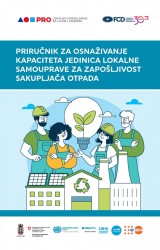 Manual for Strengthening the Capacities of Local Self-Government Units for the Employability of Waste Pickers
Manual for Strengthening the Capacities of Local Self-Government Units for the Employability of Waste Pickers
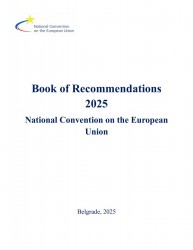 NCEU Book of Recommendations 2025
NCEU Book of Recommendations 2025
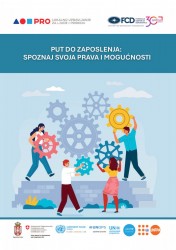 Manual “The Path to Employment: Get to Know Your Rights and Opportunities”
Manual “The Path to Employment: Get to Know Your Rights and Opportunities”
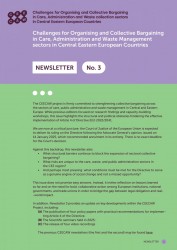 Challenges for Organising and Collective Bargaining in Care, Administration and Waste collection sectors in Central Eastern European Countries
Challenges for Organising and Collective Bargaining in Care, Administration and Waste collection sectors in Central Eastern European Countries
 Public Policy Proposals – Collective Bargaining (CEECAW)
Public Policy Proposals – Collective Bargaining (CEECAW)
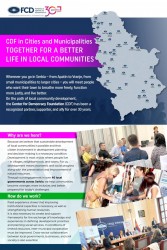 CDF in Cities and Municipalities: Together for a Better Life in Local Communities
CDF in Cities and Municipalities: Together for a Better Life in Local Communities
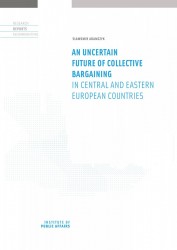 Comparative reports on collective bargaining - CEECAW
Comparative reports on collective bargaining - CEECAW
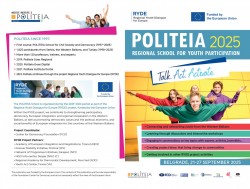 POLITEIA – Regional School for Youth Participation 2025 (leaflet)
POLITEIA – Regional School for Youth Participation 2025 (leaflet)
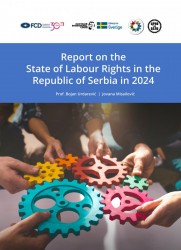 Report on the State of Labour Rights in the Republic of Serbia in 2024
Report on the State of Labour Rights in the Republic of Serbia in 2024
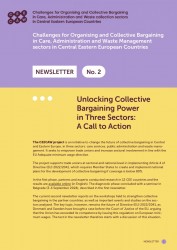 Unlocking Collective Bargaining Power in Three Sectors: A Call to Action
Unlocking Collective Bargaining Power in Three Sectors: A Call to Action
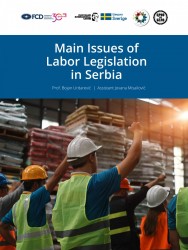 Main Issues of Labor Legislation in Serbia
Main Issues of Labor Legislation in Serbia
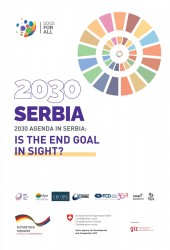 New Monitoring Report by the “SDGs for All” Platform: Is the End Goal in Sight?
New Monitoring Report by the “SDGs for All” Platform: Is the End Goal in Sight?
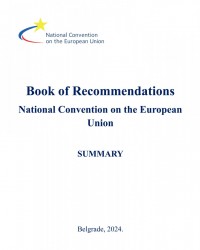 NCEU Book of Recommendations 2024 (Summary)
NCEU Book of Recommendations 2024 (Summary)
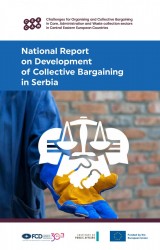 National reports on collective bargaining in Serbia - CEECAW
National reports on collective bargaining in Serbia - CEECAW
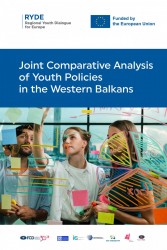 The Comparative Analysis of Youth Policies in the Western Balkans (WB)
The Comparative Analysis of Youth Policies in the Western Balkans (WB)
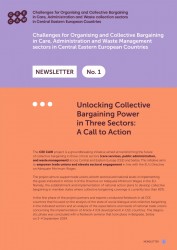 Unlocking Collective Bargaining Power in Three Sectors: A Call to Action
Unlocking Collective Bargaining Power in Three Sectors: A Call to Action
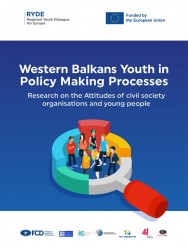 Western Balkans Youth in Policy Making Processes
Western Balkans Youth in Policy Making Processes
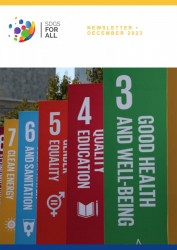 SDGs for All Platform newsletter (December 2023)
SDGs for All Platform newsletter (December 2023)


